牛津译林版英语八年级下Unit 4 A good read周末复习学案(重点词汇+重点知识梳理+语法梳理+重点短语)
文档属性
| 名称 | 牛津译林版英语八年级下Unit 4 A good read周末复习学案(重点词汇+重点知识梳理+语法梳理+重点短语) |
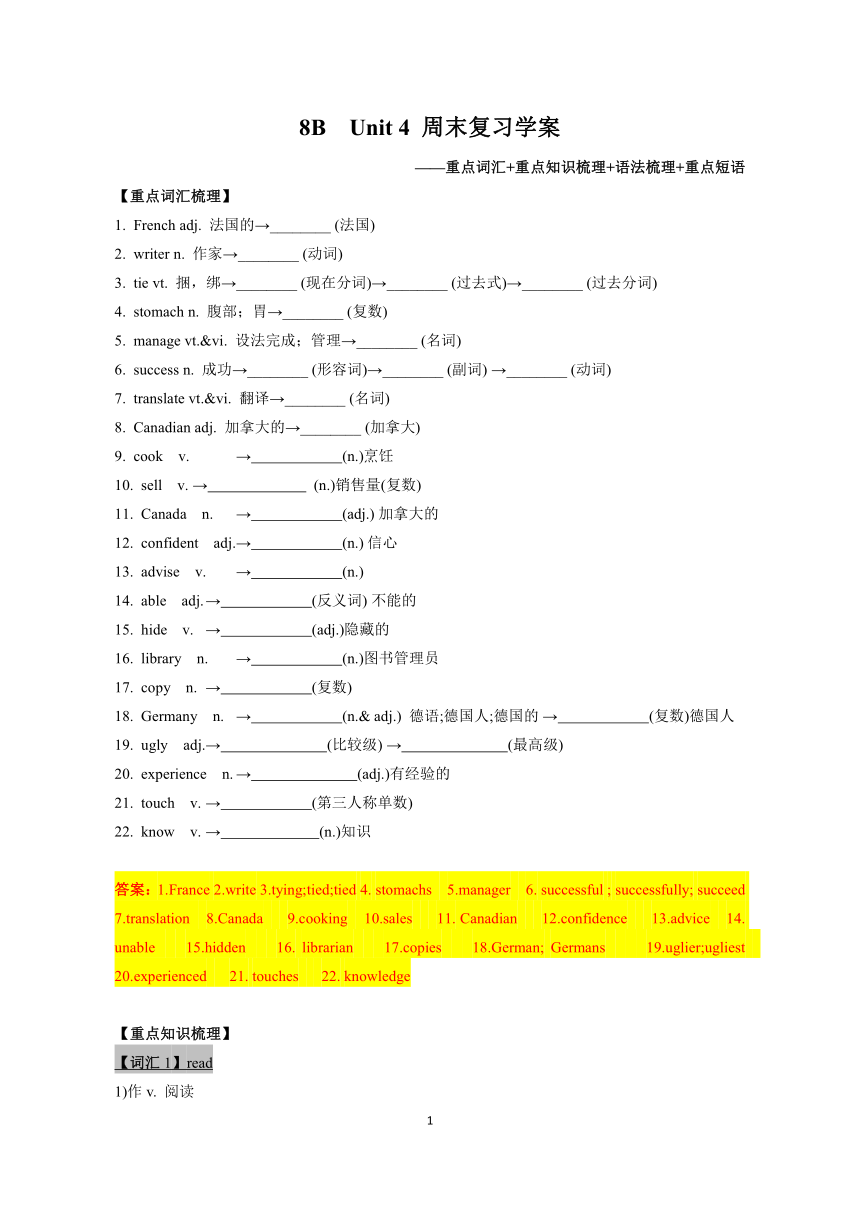
|
|
| 格式 | docx | ||
| 文件大小 | 84.5KB | ||
| 资源类型 | 教案 | ||
| 版本资源 | 牛津译林版 | ||
| 科目 | 英语 | ||
| 更新时间 | 2021-03-31 21:44:28 | ||
图片预览

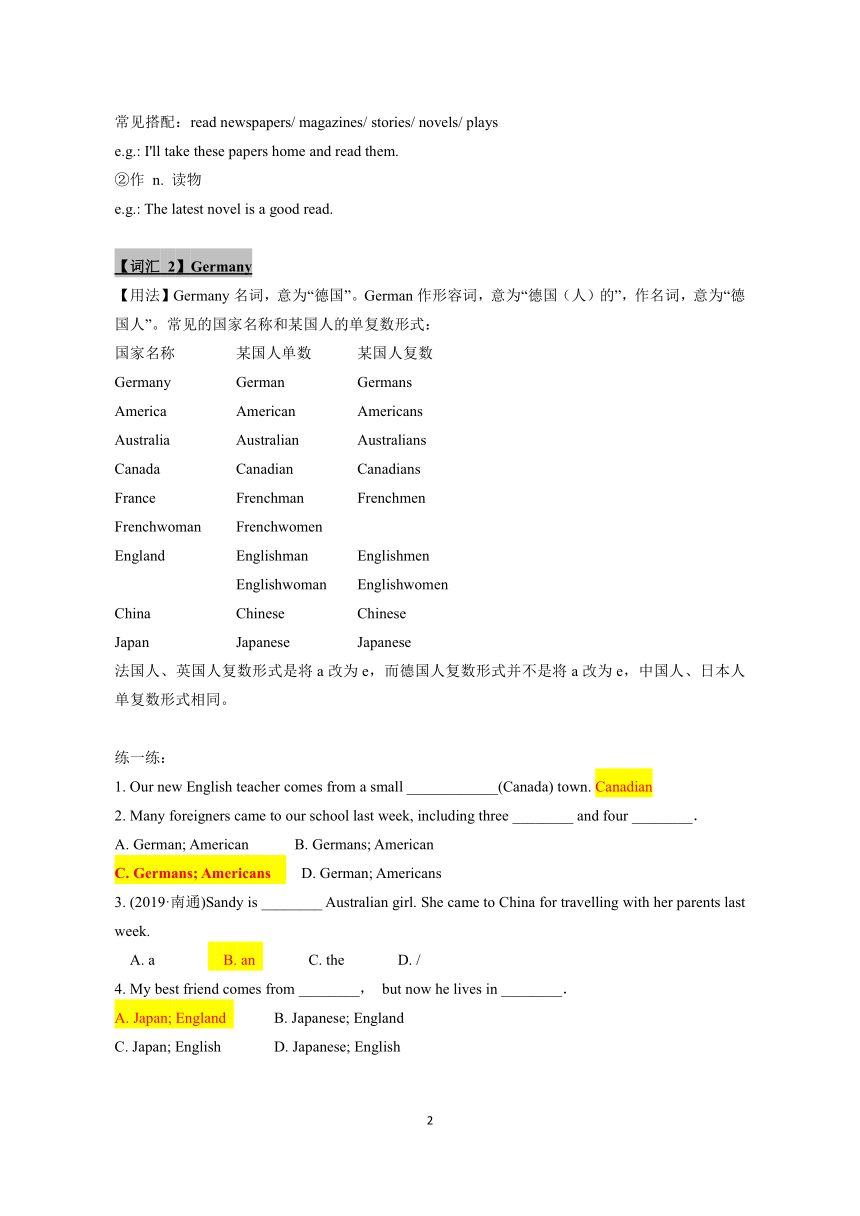
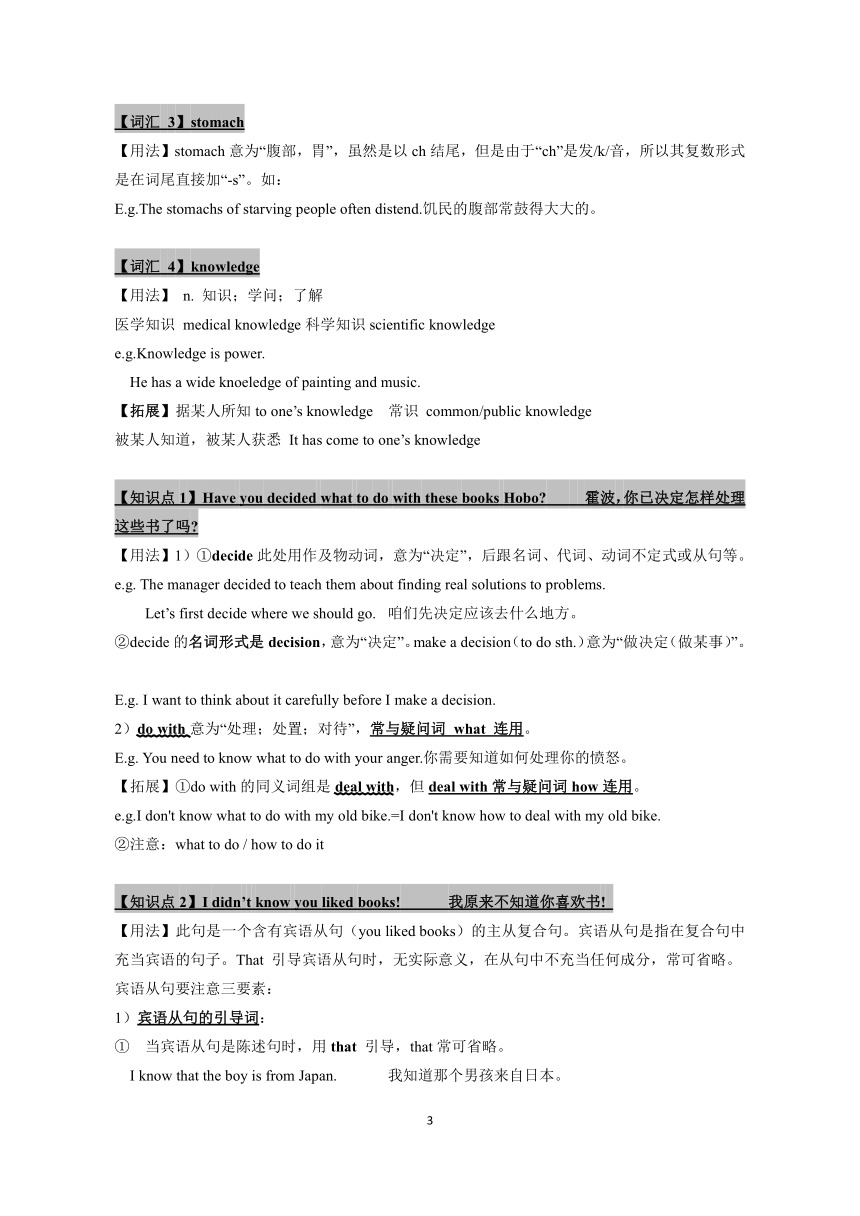
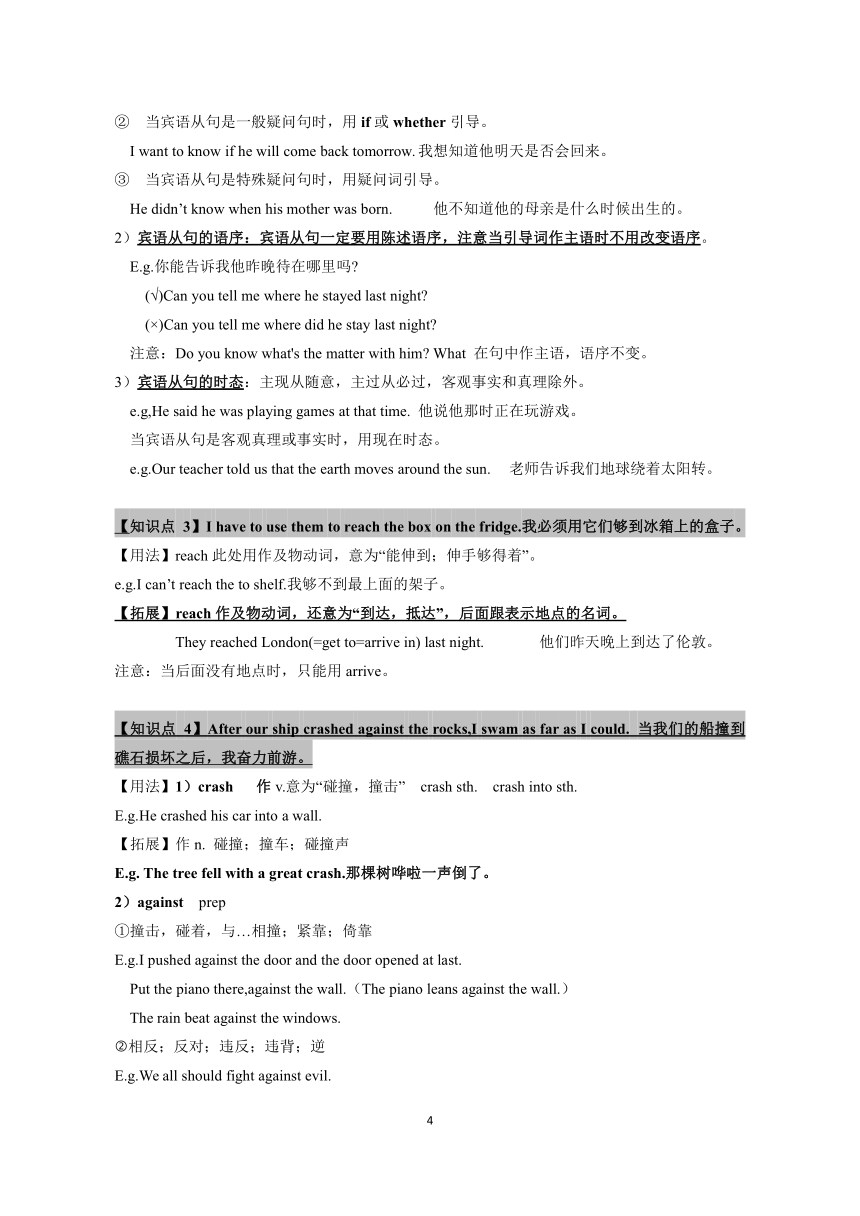
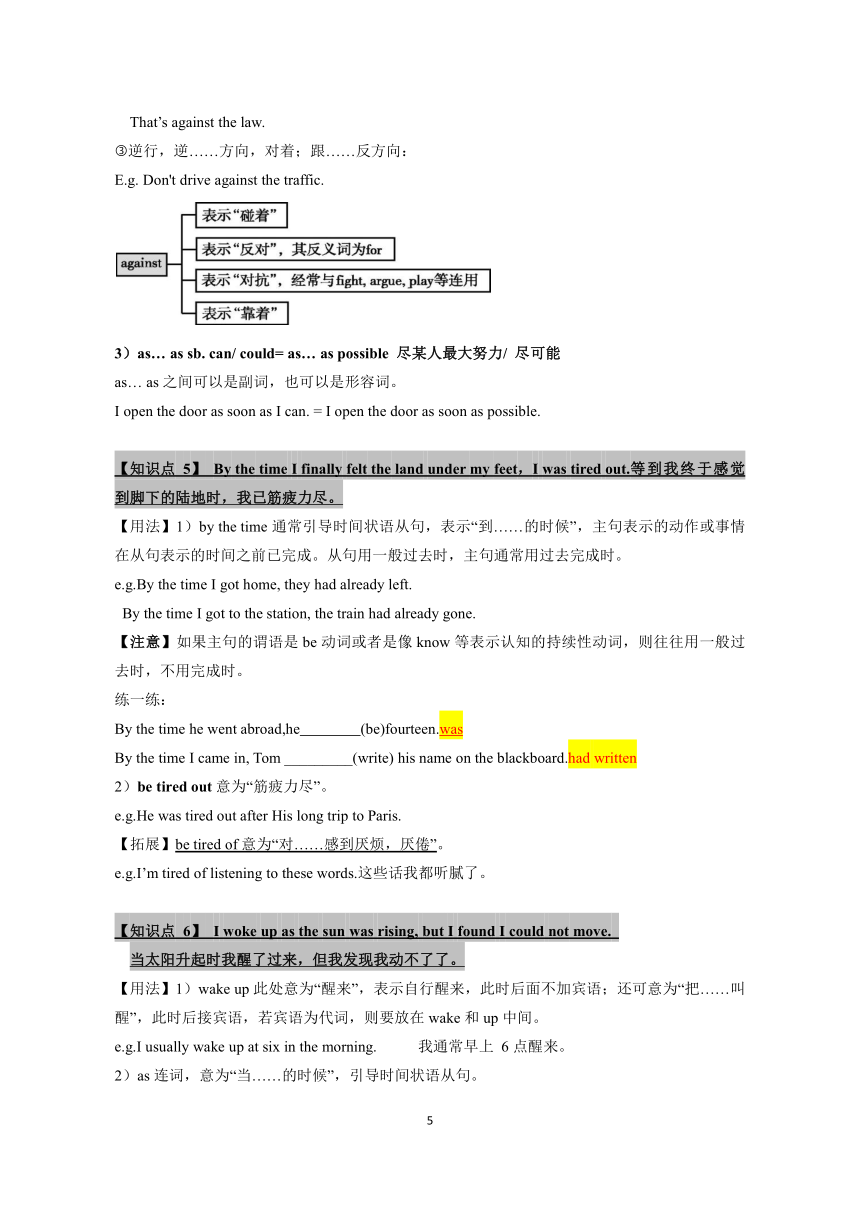
文档简介
8B
Unit
4
周末复习学案
——重点词汇+重点知识梳理+语法梳理+重点短语
【重点词汇梳理】
French
adj.
法国的→________
(法国)
writer
n.
作家→________
(动词)
tie
vt.
捆,绑→________
(现在分词)→________
(过去式)→________
(过去分词)
stomach
n.
腹部;胃→________
(复数)
manage
vt.&vi.
设法完成;管理→________
(名词)
success
n.
成功→________
(形容词)→________
(副词)
→________
(动词)
translate
vt.&vi.
翻译→________
(名词)
Canadian
adj.
加拿大的→________
(加拿大)
cook
v.
→
(n.)烹饪?
sell
v.
→
(n.)销售量(复数)?
Canada
n.
→
(adj.)?加拿大的
confident
adj.
→
(n.)?信心
advise
v.
→
(n.)?
able
adj.
→
(反义词)?不能的
hide
v.
→
(adj.)隐藏的
library
n.
→
(n.)图书管理员?
copy
n.
→
(复数)?
Germany
n.
→
(n.&
adj.)
德语;德国人;德国的?→
(复数)德国人?
ugly
adj.
→
(比较级)?→
(最高级)?
experience
n.
→
(adj.)有经验的?
touch
v.
→
(第三人称单数)?
know
v.
→
(n.)知识?
答案:1.France
2.write
3.tying;tied;tied
4.
stomachs
5.manager
6.
successful
;
successfully;
succeed
7.translation
8.Canada
9.cooking
10.sales
11.
Canadian
12.confidence
13.advice
14.
unable
15.hidden
16.
librarian
17.copies
18.German;
Germans
19.uglier;ugliest
20.experienced
21.
touches
22.
knowledge
【重点知识梳理】
【词汇1】read
1)作v.
阅读
常见搭配:read
newspapers/
magazines/
stories/
novels/
plays
e.g.:
I'll
take
these
papers
home
and
read
them.
②作
n.
读物
e.g.:
The
latest
novel
is
a
good
read.
【词汇
2】Germany
【用法】Germany名词,意为“德国”。German作形容词,意为“德国(人)的”,作名词,意为“德国人”。常见的国家名称和某国人的单复数形式:
国家名称
某国人单数
某国人复数
Germany
German
Germans
America
American
Americans
Australia
Australian
Australians
Canada
Canadian
Canadians
France
Frenchman
Frenchmen
Frenchwoman
Frenchwomen
England
Englishman
Englishmen
Englishwoman
Englishwomen
China
Chinese
Chinese
Japan
Japanese
Japanese
法国人、英国人复数形式是将a改为e,而德国人复数形式并不是将a改为e,中国人、日本人单复数形式相同。
练一练:
1.
Our
new
English
teacher
comes
from
a
small
____________(Canada)
town.
Canadian
2.
Many
foreigners
came
to
our
school
last
week,
including
three
________
and
four
________.
A.
German;
American
B.
Germans;
American
C.
Germans;
Americans D.
German;
Americans
3.
(2019·南通)Sandy
is
________
Australian
girl.
She
came
to
China
for
travelling
with
her
parents
last
week.
A.
a
B.
an
C.
the
D.
/
4.
My
best
friend
comes
from
________,
but
now
he
lives
in
________.
A.
Japan;
England
B.
Japanese;
England
C.
Japan;
English
D.
Japanese;
English
【词汇
3】stomach
【用法】stomach意为“腹部,胃”,虽然是以ch结尾,但是由于“ch”是发/k/音,所以其复数形式是在词尾直接加“-s”。如:
E.g.The
stomachs
of
starving
people
often
distend.饥民的腹部常鼓得大大的。
【词汇
4】knowledge
【用法】
n.
知识;学问;了解
医学知识
medical
knowledge科学知识scientific
knowledge
e.g.Knowledge
is
power.
He
has
a
wide
knoeledge
of
painting
and
music.
【拓展】据某人所知to
one’s
knowledge
常识
common/public
knowledge
被某人知道,被某人获悉
It
has
come
to
one’s
knowledge
【知识点1】Have
you
decided
what
to
do
with
these
books
Hobo?
霍波,你已决定怎样处理这些书了吗?
【用法】1)①decide此处用作及物动词,意为“决定”,后跟名词、代词、动词不定式或从句等。
e.g.
The
manager
decided
to
teach
them
about
finding
real
solutions
to
problems.
Let’s
first
decide
where
we
should
go.
咱们先决定应该去什么地方。
②decide的名词形式是decision,意为“决定”。make
a
decision(to
do
sth.)意为“做决定(做某事)”。
E.g.
I
want
to
think
about
it
carefully
before
I
make
a
decision.
2)do
with意为“处理;处置;对待”,常与疑问词
what
连用。
E.g.
You
need
to
know
what
to
do
with
your
anger.你需要知道如何处理你的愤怒。
【拓展】①do
with的同义词组是deal
with,但deal
with常与疑问词how连用。
e.g.I
don't
know
what
to
do
with
my
old
bike.=I
don't
know
how
to
deal
with
my
old
bike.
②注意:what
to
do
/
how
to
do
it
【知识点2】I
didn’t
know
you
liked
books!
我原来不知道你喜欢书!
【用法】此句是一个含有宾语从句(you
liked
books)的主从复合句。宾语从句是指在复合句中充当宾语的句子。That
引导宾语从句时,无实际意义,在从句中不充当任何成分,常可省略。
宾语从句要注意三要素:
1)宾语从句的引导词:
①
当宾语从句是陈述句时,用that
引导,that常可省略。
I
know
that
the
boy
is
from
Japan.
我知道那个男孩来自日本。
②
当宾语从句是一般疑问句时,用if或whether引导。
I
want
to
know
if
he
will
come
back
tomorrow.
我想知道他明天是否会回来。
③
当宾语从句是特殊疑问句时,用疑问词引导。
He
didn’t
know
when
his
mother
was
born.
他不知道他的母亲是什么时候出生的。
2)宾语从句的语序:宾语从句一定要用陈述语序,注意当引导词作主语时不用改变语序。
E.g.你能告诉我他昨晚待在哪里吗?
(√)Can
you
tell
me
where
he
stayed
last
night?
(×)Can
you
tell
me
where
did
he
stay
last
night?
注意:Do
you
know
what's
the
matter
with
him?
What
在句中作主语,语序不变。
3)宾语从句的时态:主现从随意,主过从必过,客观事实和真理除外。
e.g,He
said
he
was
playing
games
at
that
time.
他说他那时正在玩游戏。
当宾语从句是客观真理或事实时,用现在时态。
e.g.Our
teacher
told
us
that
the
earth
moves
around
the
sun.
老师告诉我们地球绕着太阳转。
【知识点
3】I
have
to
use
them
to
reach
the
box
on
the
fridge.我必须用它们够到冰箱上的盒子。
【用法】reach此处用作及物动词,意为“能伸到;伸手够得着”。
e.g.I
can’t
reach
the
to
shelf.我够不到最上面的架子。
【拓展】reach作及物动词,还意为“到达,抵达”,后面跟表示地点的名词。
They
reached
London(=get
to=arrive
in)
last
night.
他们昨天晚上到达了伦敦。
注意:当后面没有地点时,只能用arrive。
【知识点
4】After
our
ship
crashed
against
the
rocks,I
swam
as
far
as
I
could.
当我们的船撞到礁石损坏之后,我奋力前游。
【用法】1)crash
作v.意为“碰撞,撞击”
crash
sth.
crash
into
sth.
E.g.He
crashed
his
car
into
a
wall.
【拓展】作n.
碰撞;撞车;碰撞声
E.g.
The
tree
fell
with
a
great
crash.那棵树哗啦一声倒了。
2)against
prep
①撞击,碰着,与…相撞;紧靠;倚靠
E.g.I
pushed
against
the
door
and
the
door
opened
at
last.
Put
the
piano
there,against
the
wall.(The
piano
leans
against
the
wall.)
The
rain
beat
against
the
windows.
相反;反对;违反;违背;逆
E.g.We
all
should
fight
against
evil.
That’s
against
the
law.
逆行,逆……方向,对着;跟……反方向:
E.g.
Don't
drive
against
the
traffic.
3)as…
as
sb.
can/
could=
as…
as
possible
尽某人最大努力/
尽可能
as…
as之间可以是副词,也可以是形容词。
I
open
the
door
as
soon
as
I
can.
=
I
open
the
door
as
soon
as
possible.
【知识点
5】
By
the
time
I
finally
felt
the
land
under
my
feet,I
was
tired
out.
等到我终于感觉到脚下的陆地时,我已筋疲力尽。
【用法】1)by
the
time通常引导时间状语从句,表示“到……的时候”,主句表示的动作或事情在从句表示的时间之前已完成。从句用一般过去时,主句通常用过去完成时。
e.g.By
the
time
I
got
home,
they
had
already
left.
By
the
time
I
got
to
the
station,
the
train
had
already
gone.
【注意】如果主句的谓语是be动词或者是像know等表示认知的持续性动词,则往往用一般过去时,不用完成时。
练一练:
By
the
time
he
went
abroad,he
(be)fourteen.was
By
the
time
I
came
in,
Tom
_________(write)
his
name
on
the
blackboard.had
written
2)be
tired
out意为“筋疲力尽”。
e.g.He
was
tired
out
after
His
long
trip
to
Paris.
【拓展】be
tired
of意为“对……感到厌烦,厌倦”。
e.g.I’m
tired
of
listening
to
these
words.这些话我都听腻了。
【知识点
6】
I
woke
up
as
the
sun
was
rising,
but
I
found
I
could
not
move.
当太阳升起时我醒了过来,但我发现我动不了了。
【用法】1)wake
up此处意为“醒来”,表示自行醒来,此时后面不加宾语;还可意为“把……叫醒”,此时后接宾语,若宾语为代词,则要放在wake和up中间。
e.g.I
usually
wake
up
at
six
in
the
morning.
我通常早上
6点醒来。
2)as连词,意为“当……的时候”,引导时间状语从句。
e.g.As
time
goes
on,
he
knows
his
students.
随着时间的推移,他了解他的学生。
【拓展】①as
作连词,还可意为“因为,由于”,引导原因状语从句。
e.g.As
you
were
out,I
left
a
note.因为你不在,我留了一张便条。
辨析
as,when与while
此三者都可引导时间状语从句,但用法不同。
①as,引导的从句中谓语动词可以是延续性动词,也可以是非延续性动词,主从句所述动作同时发生,意为“一边……一边……”。
E.g.As
he
looked,
a
man
came
near.
正当他看的时候,一名男子走上前来。
②when,引导的从句中谓语动词可以是延续性动词,也可以是非延续性动词,主从句所述动作可同时发生,也可先后发生。
E.g.I
went
to
bed
when
I
finished
my
homework.
做完作业,我就去睡觉了。
③while,引导的从句中谓语动词必须是延续性动词,多表示主从句动作同时发生,也可表示对比。
E.g.Please
write
while
I
read.
我读的时候请写一写。
3)rise(rose,risen,rising)不及物动词,意为“(太阳、月亮、星星等)升起,上升”。
E.g.The
sun
rises
in
the
east
and
sets
in
the
west.
太阳东升西落。
辨析
rise与raise
rise(rose,risen,rising)
上升,升起,增加
不及物动词,后面不直接接宾语,无被动语态,主语通常是物,主要指日、月、星等的升起,潮水的上涨,温度的上升,物价上涨等不可人为控制的情况。
Raise(raised,raised,raising)
举起,增加,提升。筹集,养育
及物动词,后面直接跟宾语,主语常是人,指人为可控的上涨。
e.g.The
temperature
is
rising.
温度在升高。
He
raised
his
hand
and
then
put
down.
他把手举起来然后又放下了。
【知识点
7】It
moved
up
over
my
stomach
and
neck
until
it
was
standing
near
my
face.
(
P50
)
它向上爬过我的腹部和脖子,直到站在我的脸附近。
【用法】1)until
为连词,意为“直到……为止”,表示某一种行为一直持续到某一时间,用于肯定句中,句中的谓语动词必须是延续性动词。
e.g.The
bad
weather
may
last
until
Friday.这种恶劣的天气可能要持续到星期五。
2)
until后面的从句中不能用一般将来时,应该用一般现在时代替,即“主将从现”。
e.g.He
will
stay
here
until
his
mother
comes
back.
【拓展】
not…until意为“直到……才”,表示直到某一时间,某一行为才发生。until用于否定句中,主句的谓语动词通常是短暂性动词。
I
didn’t
begin
to
watch
TV
until
my
mother
came
back.
直到妈妈回来,我才开始看电视。
练一练
Time
waits
for
no
man.
But
some
people
won
’t
realize
the
importance
of
time
it
’s
gone.?
A.as
B.since
C.when
D.until
【解析】考查固定句型。句意:时间不等人。但是有些人直到时间过去了才意识到它的重要性。not…until…意为“直到……才……”。由题意可知选D。
—
________
will
the
discussion
last?
—
________
we
reach
an
agreement.
A.
How
long;
Not
until
B.
When;
Not
until
C.
How
long;
Until
D.
When;
Until
【知识点
8】He
was
the
same
size
as
my
little
finger!
他不过小手指那么点大!
【用法】same
size
as...意为“和……一样尺寸,与……样大小”。
My
mother’s
shoes
are
the
same
size
as
mine.
我妈妈的鞋和我的鞋号码相同。
【拓展】①
the
same
as意为“和……一样”。
My
uniform
is
the
same
as
Simon’s.
我的校服与西蒙的(校服)相同。
②
the
same...as...意为“和……一样……”。
My
coat
is
the
same
colour
as
yours.
我的外套和你的颜色相同
【知识点
9】I
did
not
know
what
to
say
either.我也不知道说什么。
【用法】辨析
also,too,as
well与either“也”
also,as
well,too用于肯定句,also常用于be动词、情态动词、助动词之后,行为动词之前;as
well,too用于句末;either用于否定句中,置于句末。
e.g.He
went
there
too.
We
didn't
go
there
either.
I
like
you
as
well.
You
are
also
a
good
student.
【知识点
10】I
tried
to
pull
one
hand
free
and
finally
managed
to
break
the
ropes.(P51)
我试图空出一只手,最后设法解开了绳子。
【用法】1)manage
to
do
sth.意为“设法做某事”,更倾向于做成某事,与succeed
in
doing
sth.同义
2)try
to
do
sth.倾向于努力做某事,有没有成功不确定。
e.g.I
managed
to
see
the
writer.我设法见到了那个作家.
【知识点
11】The
first
Harry
Potter
book
was
a
great
success
in
the
very
beginning.(P58)
在一开始,《哈利波特》第一本书获得了巨大的成功。
【用法】1)success
不可数名词,意为“
成功(抽象意义)”,可数名词,意为“
成功的人或者事”
e.g.He
is
a
great
success
as
a
writer.
Failure
is
the
mother
of
success.失败是成功之母。
【拓展】
①
vt.succeed用法:succeed
in
doing
sth.
成功地做某事。=do
sth.
successfully
e.g.She
succeeded
in
swimming
across
the
river.
②
adj.
successful成功的
E.g.My
uncle
is
a
successful
businessman.
我的叔叔是一位成功的商人。
③
adv.
successfully成功地
E.g.If
you
work
hard,you
will
get
it
successfully.
如果你努力工作,你就会取得成功。
2)in
the
beginning
在……一开始常单独使用,放在句子的开头
E.g.In
the
beginning,
he
wasn’t
a
boss.
注意:at
the
beginning后常加of
E.g.At
the
beginning
of
the
meeting,
they
sang
a
song
together.
相同的用法还有end
in
the
end&
at
the
end
of…
【知识点
12】all
the
British
publishing
houses
refused
to
publish
it
所有的英国出版社都拒绝出版它
【用法】1)refuse及物动词,意为“拒绝”,其常用搭配有:
①refuse
+
名词/代词,意为“拒绝……”。
e.g.He
refused
my
help.
他拒绝了我的帮助。
②refuse
to
do
sth.意为“拒绝做某事”。
e.g.He
refused
to
accept
my
invitation.
他拒绝接受我的邀请。
③refuse
sb.
sth.意为“拒绝某人某物”。
e.g.She
can’t
refuse
him
anything.
她不能拒绝他任何事情。
【知识点
13】I
also
want
to
travel
and
have
exciting
experiences
in
the
future.
将来我也想去旅行并有令人兴奋的经历。
【用法】1)experience此处用作可数名词,意为“经历”。
e.g.I’m
looking
forward
to
experiencing
many
interesting
things.我期待着经历很多有趣的事情。
2)experience还可用作不可数名词,意为“经验”。表示做某事的经验时,其后常接in/of
doing
sth.。
e.g.Mr
Wu
has
so
much
experience
in
teaching.
王老师在教学方面有如此多的经验。
3)experience还可作及物动词,意为“体验;经历”。
e.g.The
girl
has
never
experienced
sadness.
这个女孩从未体验过悲伤。
【拓展】experienced形容词,意为“有经验的”。
e.g.My
father
is
an
experienced
teacher.
我父亲是一个有经验的教师。
2)in
the
future意为“将来”,表示较远的将来。
I
will
be
a
doctor
in
the
future.
将来我会当一名医生。
拓展
in
future
意为“今后”,指从现在起以后的时间,相当于from
now
on。
Don’t
be
late
in
future.
以后不要迟到了。
【Grammar
梳理】
特殊疑问词+动词不定式(教材P54
Grammar)
1.
“特殊疑问词+动词不定式”的结构相当于一个名词,在句子中可作主语、宾语、表语、宾语补足语和同位语等成分。大部分特殊疑问词可用于该结构,如when,
how,
which,
where,
who等。注意:疑问词why不能用于该结构。如:
Where
to
go
is
still
a
question.
去哪里仍然是个问题。
(作主语;作主语时,谓语动词常用单数形式)
I
know
where
to
find
the
boy.
我知道哪里能找到这个男孩。(作动词know的宾语)
The
question
is
how
to
learn
English
well.
问题是怎样学好英语。(作表语)
2.①
“特殊疑问词+动词不定式”的结构经常用在某些动词(短语)后面作宾语,常见的有tell,
show,
know,
learn,
teach,
forget,
wonder,
remember,
find
out等。如:
—
I'll
show
you
how
to
do
it.我会向你展示如何做它(这件事)。
—
Thank
you.谢谢。
②“特殊疑问词+动词不定式”的结构还可以用在be
sure,
be
clear等后面作宾语。如:
I'm
not
sure
when
to
leave.
我不确定何时离开。
3.
“特殊疑问词+动词不定式”结构可以把复合句转换为简单句。如:
I
don't
know
what
I'll
do
next.
=
I
don't
know
what
to
do
next.
我不知道下一步做什么。
4.
“特殊疑问词+动词不定式”的结构可以独立成句。如:
What
to
do?
做什么?
How
to
get
rid
of
the
trouble?
如何摆脱困境?
【重点短语梳理】
1. 处理;对付?
2. 被绑在地上?
3. 将某物还给某人?
4. 朝某人大喊?
5. 筋疲力尽?
6. 醒来?
7. 和……尺寸一样?
8. 向下看?
9. 爬过某人的全身?
10.
摔倒?
11. 继续移动?
12. 设法完成某事?
13. 一大群……?
14. 朝某人径直走过来?
15. 建议某人做某事?
16. 上交;提交?
17. 碰撞上岩石?
18. 自学?
19. 准时;按时
20. 开启;
开创;
开辟?
21. 拒绝做某事?
22. 到目前为止?
23. 巨大的成功?
24. 把……翻译成
25. 每次,依次?
26. 另一方面?
27. 等等?
28. 不能做某事?
答案:
do
with
be
tied
to
the
ground
return
sb
sth
/return
sth
to
sb
shout
at
sb
be
tired
out
wake
up
the
same
size
as…
look
down
climb
all
over
sb
fall
over
continue
moving
manage
to
do
sth
a
huge
army
of…
come
straight
towards
sb
advise
sb
to
do
sth
hand
in
crash
against
the
rocks
teach
oneself
on
time
open
up
refuse
to
do
sth
so
far
a
great
success
translate…into
at
a
time
on
the
other
hand
and
so
on
be
unable
to
do
sth
Unit
4
周末复习学案
——重点词汇+重点知识梳理+语法梳理+重点短语
【重点词汇梳理】
French
adj.
法国的→________
(法国)
writer
n.
作家→________
(动词)
tie
vt.
捆,绑→________
(现在分词)→________
(过去式)→________
(过去分词)
stomach
n.
腹部;胃→________
(复数)
manage
vt.&vi.
设法完成;管理→________
(名词)
success
n.
成功→________
(形容词)→________
(副词)
→________
(动词)
translate
vt.&vi.
翻译→________
(名词)
Canadian
adj.
加拿大的→________
(加拿大)
cook
v.
→
(n.)烹饪?
sell
v.
→
(n.)销售量(复数)?
Canada
n.
→
(adj.)?加拿大的
confident
adj.
→
(n.)?信心
advise
v.
→
(n.)?
able
adj.
→
(反义词)?不能的
hide
v.
→
(adj.)隐藏的
library
n.
→
(n.)图书管理员?
copy
n.
→
(复数)?
Germany
n.
→
(n.&
adj.)
德语;德国人;德国的?→
(复数)德国人?
ugly
adj.
→
(比较级)?→
(最高级)?
experience
n.
→
(adj.)有经验的?
touch
v.
→
(第三人称单数)?
know
v.
→
(n.)知识?
答案:1.France
2.write
3.tying;tied;tied
4.
stomachs
5.manager
6.
successful
;
successfully;
succeed
7.translation
8.Canada
9.cooking
10.sales
11.
Canadian
12.confidence
13.advice
14.
unable
15.hidden
16.
librarian
17.copies
18.German;
Germans
19.uglier;ugliest
20.experienced
21.
touches
22.
knowledge
【重点知识梳理】
【词汇1】read
1)作v.
阅读
常见搭配:read
newspapers/
magazines/
stories/
novels/
plays
e.g.:
I'll
take
these
papers
home
and
read
them.
②作
n.
读物
e.g.:
The
latest
novel
is
a
good
read.
【词汇
2】Germany
【用法】Germany名词,意为“德国”。German作形容词,意为“德国(人)的”,作名词,意为“德国人”。常见的国家名称和某国人的单复数形式:
国家名称
某国人单数
某国人复数
Germany
German
Germans
America
American
Americans
Australia
Australian
Australians
Canada
Canadian
Canadians
France
Frenchman
Frenchmen
Frenchwoman
Frenchwomen
England
Englishman
Englishmen
Englishwoman
Englishwomen
China
Chinese
Chinese
Japan
Japanese
Japanese
法国人、英国人复数形式是将a改为e,而德国人复数形式并不是将a改为e,中国人、日本人单复数形式相同。
练一练:
1.
Our
new
English
teacher
comes
from
a
small
____________(Canada)
town.
Canadian
2.
Many
foreigners
came
to
our
school
last
week,
including
three
________
and
four
________.
A.
German;
American
B.
Germans;
American
C.
Germans;
Americans D.
German;
Americans
3.
(2019·南通)Sandy
is
________
Australian
girl.
She
came
to
China
for
travelling
with
her
parents
last
week.
A.
a
B.
an
C.
the
D.
/
4.
My
best
friend
comes
from
________,
but
now
he
lives
in
________.
A.
Japan;
England
B.
Japanese;
England
C.
Japan;
English
D.
Japanese;
English
【词汇
3】stomach
【用法】stomach意为“腹部,胃”,虽然是以ch结尾,但是由于“ch”是发/k/音,所以其复数形式是在词尾直接加“-s”。如:
E.g.The
stomachs
of
starving
people
often
distend.饥民的腹部常鼓得大大的。
【词汇
4】knowledge
【用法】
n.
知识;学问;了解
医学知识
medical
knowledge科学知识scientific
knowledge
e.g.Knowledge
is
power.
He
has
a
wide
knoeledge
of
painting
and
music.
【拓展】据某人所知to
one’s
knowledge
常识
common/public
knowledge
被某人知道,被某人获悉
It
has
come
to
one’s
knowledge
【知识点1】Have
you
decided
what
to
do
with
these
books
Hobo?
霍波,你已决定怎样处理这些书了吗?
【用法】1)①decide此处用作及物动词,意为“决定”,后跟名词、代词、动词不定式或从句等。
e.g.
The
manager
decided
to
teach
them
about
finding
real
solutions
to
problems.
Let’s
first
decide
where
we
should
go.
咱们先决定应该去什么地方。
②decide的名词形式是decision,意为“决定”。make
a
decision(to
do
sth.)意为“做决定(做某事)”。
E.g.
I
want
to
think
about
it
carefully
before
I
make
a
decision.
2)do
with意为“处理;处置;对待”,常与疑问词
what
连用。
E.g.
You
need
to
know
what
to
do
with
your
anger.你需要知道如何处理你的愤怒。
【拓展】①do
with的同义词组是deal
with,但deal
with常与疑问词how连用。
e.g.I
don't
know
what
to
do
with
my
old
bike.=I
don't
know
how
to
deal
with
my
old
bike.
②注意:what
to
do
/
how
to
do
it
【知识点2】I
didn’t
know
you
liked
books!
我原来不知道你喜欢书!
【用法】此句是一个含有宾语从句(you
liked
books)的主从复合句。宾语从句是指在复合句中充当宾语的句子。That
引导宾语从句时,无实际意义,在从句中不充当任何成分,常可省略。
宾语从句要注意三要素:
1)宾语从句的引导词:
①
当宾语从句是陈述句时,用that
引导,that常可省略。
I
know
that
the
boy
is
from
Japan.
我知道那个男孩来自日本。
②
当宾语从句是一般疑问句时,用if或whether引导。
I
want
to
know
if
he
will
come
back
tomorrow.
我想知道他明天是否会回来。
③
当宾语从句是特殊疑问句时,用疑问词引导。
He
didn’t
know
when
his
mother
was
born.
他不知道他的母亲是什么时候出生的。
2)宾语从句的语序:宾语从句一定要用陈述语序,注意当引导词作主语时不用改变语序。
E.g.你能告诉我他昨晚待在哪里吗?
(√)Can
you
tell
me
where
he
stayed
last
night?
(×)Can
you
tell
me
where
did
he
stay
last
night?
注意:Do
you
know
what's
the
matter
with
him?
What
在句中作主语,语序不变。
3)宾语从句的时态:主现从随意,主过从必过,客观事实和真理除外。
e.g,He
said
he
was
playing
games
at
that
time.
他说他那时正在玩游戏。
当宾语从句是客观真理或事实时,用现在时态。
e.g.Our
teacher
told
us
that
the
earth
moves
around
the
sun.
老师告诉我们地球绕着太阳转。
【知识点
3】I
have
to
use
them
to
reach
the
box
on
the
fridge.我必须用它们够到冰箱上的盒子。
【用法】reach此处用作及物动词,意为“能伸到;伸手够得着”。
e.g.I
can’t
reach
the
to
shelf.我够不到最上面的架子。
【拓展】reach作及物动词,还意为“到达,抵达”,后面跟表示地点的名词。
They
reached
London(=get
to=arrive
in)
last
night.
他们昨天晚上到达了伦敦。
注意:当后面没有地点时,只能用arrive。
【知识点
4】After
our
ship
crashed
against
the
rocks,I
swam
as
far
as
I
could.
当我们的船撞到礁石损坏之后,我奋力前游。
【用法】1)crash
作v.意为“碰撞,撞击”
crash
sth.
crash
into
sth.
E.g.He
crashed
his
car
into
a
wall.
【拓展】作n.
碰撞;撞车;碰撞声
E.g.
The
tree
fell
with
a
great
crash.那棵树哗啦一声倒了。
2)against
prep
①撞击,碰着,与…相撞;紧靠;倚靠
E.g.I
pushed
against
the
door
and
the
door
opened
at
last.
Put
the
piano
there,against
the
wall.(The
piano
leans
against
the
wall.)
The
rain
beat
against
the
windows.
相反;反对;违反;违背;逆
E.g.We
all
should
fight
against
evil.
That’s
against
the
law.
逆行,逆……方向,对着;跟……反方向:
E.g.
Don't
drive
against
the
traffic.
3)as…
as
sb.
can/
could=
as…
as
possible
尽某人最大努力/
尽可能
as…
as之间可以是副词,也可以是形容词。
I
open
the
door
as
soon
as
I
can.
=
I
open
the
door
as
soon
as
possible.
【知识点
5】
By
the
time
I
finally
felt
the
land
under
my
feet,I
was
tired
out.
等到我终于感觉到脚下的陆地时,我已筋疲力尽。
【用法】1)by
the
time通常引导时间状语从句,表示“到……的时候”,主句表示的动作或事情在从句表示的时间之前已完成。从句用一般过去时,主句通常用过去完成时。
e.g.By
the
time
I
got
home,
they
had
already
left.
By
the
time
I
got
to
the
station,
the
train
had
already
gone.
【注意】如果主句的谓语是be动词或者是像know等表示认知的持续性动词,则往往用一般过去时,不用完成时。
练一练:
By
the
time
he
went
abroad,he
(be)fourteen.was
By
the
time
I
came
in,
Tom
_________(write)
his
name
on
the
blackboard.had
written
2)be
tired
out意为“筋疲力尽”。
e.g.He
was
tired
out
after
His
long
trip
to
Paris.
【拓展】be
tired
of意为“对……感到厌烦,厌倦”。
e.g.I’m
tired
of
listening
to
these
words.这些话我都听腻了。
【知识点
6】
I
woke
up
as
the
sun
was
rising,
but
I
found
I
could
not
move.
当太阳升起时我醒了过来,但我发现我动不了了。
【用法】1)wake
up此处意为“醒来”,表示自行醒来,此时后面不加宾语;还可意为“把……叫醒”,此时后接宾语,若宾语为代词,则要放在wake和up中间。
e.g.I
usually
wake
up
at
six
in
the
morning.
我通常早上
6点醒来。
2)as连词,意为“当……的时候”,引导时间状语从句。
e.g.As
time
goes
on,
he
knows
his
students.
随着时间的推移,他了解他的学生。
【拓展】①as
作连词,还可意为“因为,由于”,引导原因状语从句。
e.g.As
you
were
out,I
left
a
note.因为你不在,我留了一张便条。
辨析
as,when与while
此三者都可引导时间状语从句,但用法不同。
①as,引导的从句中谓语动词可以是延续性动词,也可以是非延续性动词,主从句所述动作同时发生,意为“一边……一边……”。
E.g.As
he
looked,
a
man
came
near.
正当他看的时候,一名男子走上前来。
②when,引导的从句中谓语动词可以是延续性动词,也可以是非延续性动词,主从句所述动作可同时发生,也可先后发生。
E.g.I
went
to
bed
when
I
finished
my
homework.
做完作业,我就去睡觉了。
③while,引导的从句中谓语动词必须是延续性动词,多表示主从句动作同时发生,也可表示对比。
E.g.Please
write
while
I
read.
我读的时候请写一写。
3)rise(rose,risen,rising)不及物动词,意为“(太阳、月亮、星星等)升起,上升”。
E.g.The
sun
rises
in
the
east
and
sets
in
the
west.
太阳东升西落。
辨析
rise与raise
rise(rose,risen,rising)
上升,升起,增加
不及物动词,后面不直接接宾语,无被动语态,主语通常是物,主要指日、月、星等的升起,潮水的上涨,温度的上升,物价上涨等不可人为控制的情况。
Raise(raised,raised,raising)
举起,增加,提升。筹集,养育
及物动词,后面直接跟宾语,主语常是人,指人为可控的上涨。
e.g.The
temperature
is
rising.
温度在升高。
He
raised
his
hand
and
then
put
down.
他把手举起来然后又放下了。
【知识点
7】It
moved
up
over
my
stomach
and
neck
until
it
was
standing
near
my
face.
(
P50
)
它向上爬过我的腹部和脖子,直到站在我的脸附近。
【用法】1)until
为连词,意为“直到……为止”,表示某一种行为一直持续到某一时间,用于肯定句中,句中的谓语动词必须是延续性动词。
e.g.The
bad
weather
may
last
until
Friday.这种恶劣的天气可能要持续到星期五。
2)
until后面的从句中不能用一般将来时,应该用一般现在时代替,即“主将从现”。
e.g.He
will
stay
here
until
his
mother
comes
back.
【拓展】
not…until意为“直到……才”,表示直到某一时间,某一行为才发生。until用于否定句中,主句的谓语动词通常是短暂性动词。
I
didn’t
begin
to
watch
TV
until
my
mother
came
back.
直到妈妈回来,我才开始看电视。
练一练
Time
waits
for
no
man.
But
some
people
won
’t
realize
the
importance
of
time
it
’s
gone.?
A.as
B.since
C.when
D.until
【解析】考查固定句型。句意:时间不等人。但是有些人直到时间过去了才意识到它的重要性。not…until…意为“直到……才……”。由题意可知选D。
—
________
will
the
discussion
last?
—
________
we
reach
an
agreement.
A.
How
long;
Not
until
B.
When;
Not
until
C.
How
long;
Until
D.
When;
Until
【知识点
8】He
was
the
same
size
as
my
little
finger!
他不过小手指那么点大!
【用法】same
size
as...意为“和……一样尺寸,与……样大小”。
My
mother’s
shoes
are
the
same
size
as
mine.
我妈妈的鞋和我的鞋号码相同。
【拓展】①
the
same
as意为“和……一样”。
My
uniform
is
the
same
as
Simon’s.
我的校服与西蒙的(校服)相同。
②
the
same...as...意为“和……一样……”。
My
coat
is
the
same
colour
as
yours.
我的外套和你的颜色相同
【知识点
9】I
did
not
know
what
to
say
either.我也不知道说什么。
【用法】辨析
also,too,as
well与either“也”
also,as
well,too用于肯定句,also常用于be动词、情态动词、助动词之后,行为动词之前;as
well,too用于句末;either用于否定句中,置于句末。
e.g.He
went
there
too.
We
didn't
go
there
either.
I
like
you
as
well.
You
are
also
a
good
student.
【知识点
10】I
tried
to
pull
one
hand
free
and
finally
managed
to
break
the
ropes.(P51)
我试图空出一只手,最后设法解开了绳子。
【用法】1)manage
to
do
sth.意为“设法做某事”,更倾向于做成某事,与succeed
in
doing
sth.同义
2)try
to
do
sth.倾向于努力做某事,有没有成功不确定。
e.g.I
managed
to
see
the
writer.我设法见到了那个作家.
【知识点
11】The
first
Harry
Potter
book
was
a
great
success
in
the
very
beginning.(P58)
在一开始,《哈利波特》第一本书获得了巨大的成功。
【用法】1)success
不可数名词,意为“
成功(抽象意义)”,可数名词,意为“
成功的人或者事”
e.g.He
is
a
great
success
as
a
writer.
Failure
is
the
mother
of
success.失败是成功之母。
【拓展】
①
vt.succeed用法:succeed
in
doing
sth.
成功地做某事。=do
sth.
successfully
e.g.She
succeeded
in
swimming
across
the
river.
②
adj.
successful成功的
E.g.My
uncle
is
a
successful
businessman.
我的叔叔是一位成功的商人。
③
adv.
successfully成功地
E.g.If
you
work
hard,you
will
get
it
successfully.
如果你努力工作,你就会取得成功。
2)in
the
beginning
在……一开始常单独使用,放在句子的开头
E.g.In
the
beginning,
he
wasn’t
a
boss.
注意:at
the
beginning后常加of
E.g.At
the
beginning
of
the
meeting,
they
sang
a
song
together.
相同的用法还有end
in
the
end&
at
the
end
of…
【知识点
12】all
the
British
publishing
houses
refused
to
publish
it
所有的英国出版社都拒绝出版它
【用法】1)refuse及物动词,意为“拒绝”,其常用搭配有:
①refuse
+
名词/代词,意为“拒绝……”。
e.g.He
refused
my
help.
他拒绝了我的帮助。
②refuse
to
do
sth.意为“拒绝做某事”。
e.g.He
refused
to
accept
my
invitation.
他拒绝接受我的邀请。
③refuse
sb.
sth.意为“拒绝某人某物”。
e.g.She
can’t
refuse
him
anything.
她不能拒绝他任何事情。
【知识点
13】I
also
want
to
travel
and
have
exciting
experiences
in
the
future.
将来我也想去旅行并有令人兴奋的经历。
【用法】1)experience此处用作可数名词,意为“经历”。
e.g.I’m
looking
forward
to
experiencing
many
interesting
things.我期待着经历很多有趣的事情。
2)experience还可用作不可数名词,意为“经验”。表示做某事的经验时,其后常接in/of
doing
sth.。
e.g.Mr
Wu
has
so
much
experience
in
teaching.
王老师在教学方面有如此多的经验。
3)experience还可作及物动词,意为“体验;经历”。
e.g.The
girl
has
never
experienced
sadness.
这个女孩从未体验过悲伤。
【拓展】experienced形容词,意为“有经验的”。
e.g.My
father
is
an
experienced
teacher.
我父亲是一个有经验的教师。
2)in
the
future意为“将来”,表示较远的将来。
I
will
be
a
doctor
in
the
future.
将来我会当一名医生。
拓展
in
future
意为“今后”,指从现在起以后的时间,相当于from
now
on。
Don’t
be
late
in
future.
以后不要迟到了。
【Grammar
梳理】
特殊疑问词+动词不定式(教材P54
Grammar)
1.
“特殊疑问词+动词不定式”的结构相当于一个名词,在句子中可作主语、宾语、表语、宾语补足语和同位语等成分。大部分特殊疑问词可用于该结构,如when,
how,
which,
where,
who等。注意:疑问词why不能用于该结构。如:
Where
to
go
is
still
a
question.
去哪里仍然是个问题。
(作主语;作主语时,谓语动词常用单数形式)
I
know
where
to
find
the
boy.
我知道哪里能找到这个男孩。(作动词know的宾语)
The
question
is
how
to
learn
English
well.
问题是怎样学好英语。(作表语)
2.①
“特殊疑问词+动词不定式”的结构经常用在某些动词(短语)后面作宾语,常见的有tell,
show,
know,
learn,
teach,
forget,
wonder,
remember,
find
out等。如:
—
I'll
show
you
how
to
do
it.我会向你展示如何做它(这件事)。
—
Thank
you.谢谢。
②“特殊疑问词+动词不定式”的结构还可以用在be
sure,
be
clear等后面作宾语。如:
I'm
not
sure
when
to
leave.
我不确定何时离开。
3.
“特殊疑问词+动词不定式”结构可以把复合句转换为简单句。如:
I
don't
know
what
I'll
do
next.
=
I
don't
know
what
to
do
next.
我不知道下一步做什么。
4.
“特殊疑问词+动词不定式”的结构可以独立成句。如:
What
to
do?
做什么?
How
to
get
rid
of
the
trouble?
如何摆脱困境?
【重点短语梳理】
1. 处理;对付?
2. 被绑在地上?
3. 将某物还给某人?
4. 朝某人大喊?
5. 筋疲力尽?
6. 醒来?
7. 和……尺寸一样?
8. 向下看?
9. 爬过某人的全身?
10.
摔倒?
11. 继续移动?
12. 设法完成某事?
13. 一大群……?
14. 朝某人径直走过来?
15. 建议某人做某事?
16. 上交;提交?
17. 碰撞上岩石?
18. 自学?
19. 准时;按时
20. 开启;
开创;
开辟?
21. 拒绝做某事?
22. 到目前为止?
23. 巨大的成功?
24. 把……翻译成
25. 每次,依次?
26. 另一方面?
27. 等等?
28. 不能做某事?
答案:
do
with
be
tied
to
the
ground
return
sb
sth
/return
sth
to
sb
shout
at
sb
be
tired
out
wake
up
the
same
size
as…
look
down
climb
all
over
sb
fall
over
continue
moving
manage
to
do
sth
a
huge
army
of…
come
straight
towards
sb
advise
sb
to
do
sth
hand
in
crash
against
the
rocks
teach
oneself
on
time
open
up
refuse
to
do
sth
so
far
a
great
success
translate…into
at
a
time
on
the
other
hand
and
so
on
be
unable
to
do
sth
